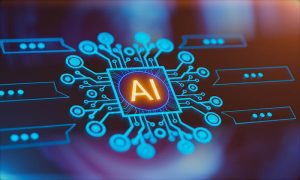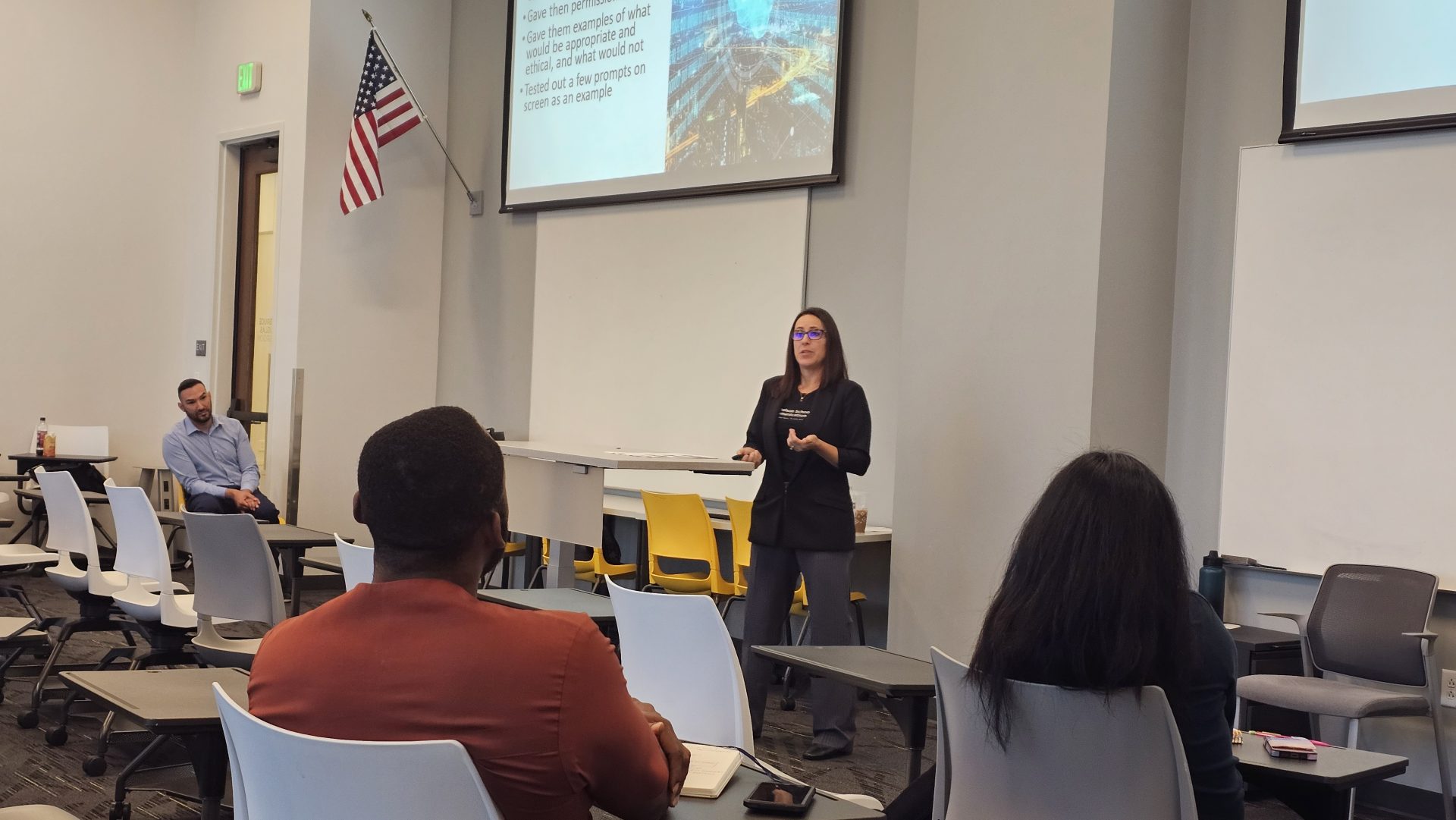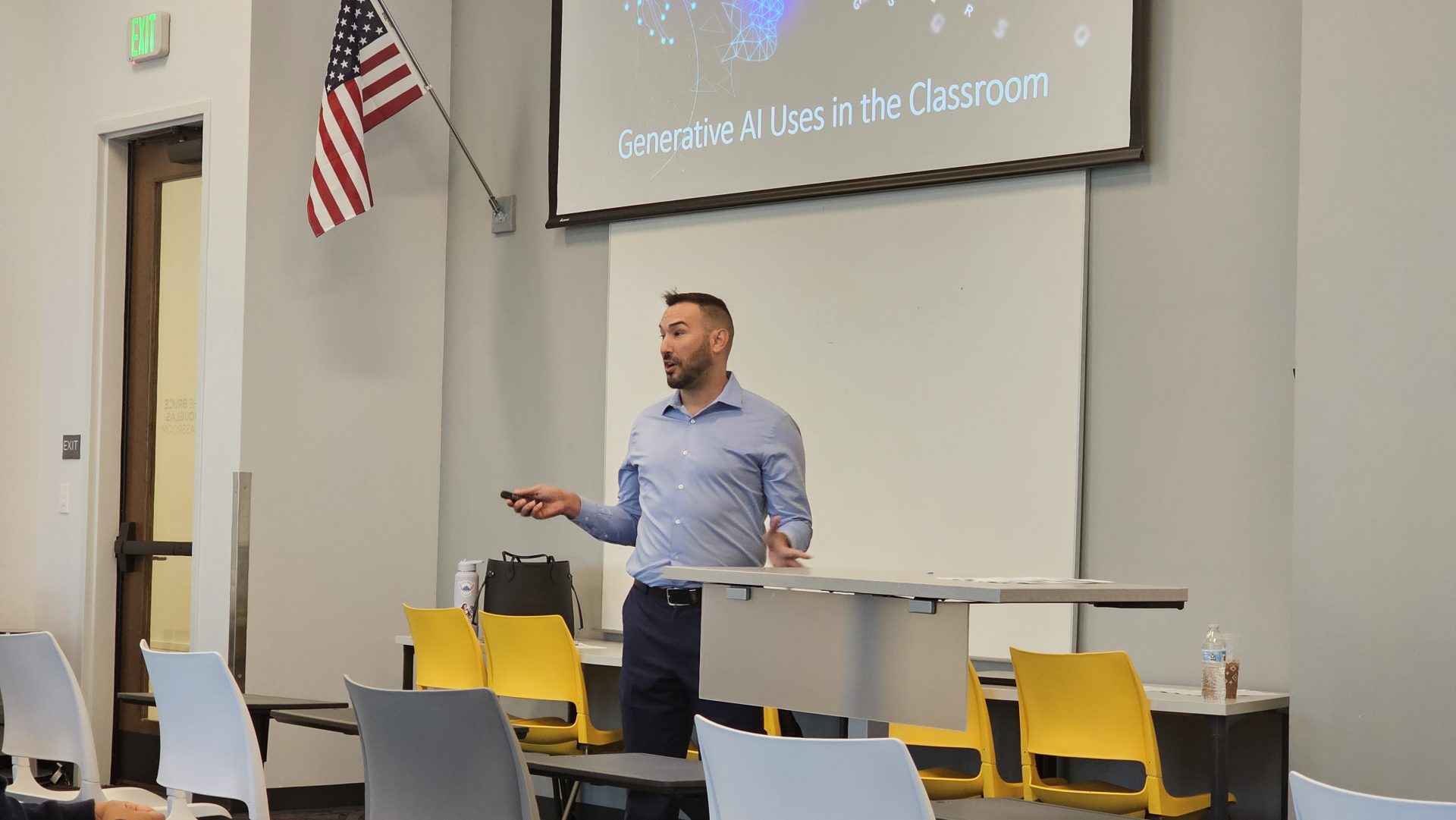
Nicholson School of Communication and Media faculty and staff had the exciting opportunity to present a report of what they learned at the Teaching and Learning with AI Conference organized by UCF’s Faculty Center for Teaching and Learning and the Division for Digital Learning.
Dr. Adam Parrish, Lecturer and Coordinator for General Education and Undergraduate Communication Programs at NSCM, compiled his notes and highlights from the conference in a presentation he shared with staff and faculty on UCF’s Downtown campus. Key takeaway points include instructional applications that AI can do including developing lesson content and activities, evaluate and critique outputs, generate quiz questions, and be a grading assistant. AI can also be a tool that can be applied to public speaking (or any COM related course) including appealing to diverse audiences, breaking down complex ideas/concepts, and can be used as in-class or out of class activity among many other reasons. Not only can AI enhance critical thinking skills, it can also be a good warm up in class.
Instructor Jamie Vega and Graduate Teaching Assistant Alex Colon discussed their discoveries and how they’re planning on using artificial intelligence in the classroom.

Jamie Vega:
Why is it important, as educators and researchers, to learn about AI?
“From what I have seen, AI is not going to go away, and on the contrary, will continue to grow into different industries and professions. Therefore, as educators, we must be prepared to do our part in preparing our students for this innovation in their future and current job roles. We have a unique opportunity to grow with AI, but we must begin that process now.”
How do you think AI will affect teaching and learning?
“In my opinion, it will be transformative. The ability for students and educators to learn and grow their skills is unlimited. Our students are eager for us to help guide them on how to effectively and ethically use AI in an educational setting. I also believe that educators may be seen as less credible if they completely refuse to incorporate AI into their curriculum in some capacity in the next 2-3 years.”
How do you envision the future of AI to look like in the classroom?
“While I don’t know enough to have a clear vision, I am incredibly excited for all of the possibilities. I’d like to imagine that AI is used as more of an assistant to work alongside of us as educators and students, helping us become more critical thinkers, while also expanding our current creative limitations.”

Alex Colon:
“In September of this year, I had the honor of participating in the inaugural AI and teaching conference, hosted by UCF’s faculty for teaching and learning. My fascination with generative AI, ignited since the advent of ChatGPT in November of last year. The wealth of insights I gained about the far-reaching implications and future trajectory of education, considering the formidable capabilities of AI, left a mark on my perspective.
This conference went beyond framing AI as merely a novel technology or communication channel, akin to the transformative impact social media had in the early 2000s. While the revolutionary nature of social media is undeniable, the conference emphasized that generative AI capabilities have the potential to reshape not only education but the entire landscape of industry. Indeed, it is the industrial realm that serves as the catalyst for crucial conversations among academics and scholars regarding the profound implications of this technology on our students and the world at large.
The keynote speaker emphasized repeatedly that companies are increasingly seeking individuals with proficiency in AI. A type of AI fluency. It is imperative for educators to contemplate the integration of AI into the classroom and, more crucially, its implications for what we expect students to learn, how they learn, and the methods by which we, as educators, assess their learning. These thought-provoking questions have spurred me to embrace them in my personal scholarly research.
Amidst the prevailing misperceptions and fears surrounding AI, one indisputable truth emerges—it is here to stay. A key takeaway from the conference is the imperative for educators to initiate conversations with students about the ethical dimensions of AI. Unpacking what AI can and cannot do, and its ramifications for integrity and critical thinking. Furthermore, the conference highlighted the potential for AI to enhance our efficiency as educators, enabling the quick generation of lesson content and activities that provide real-time feedback, fostering collaborative critique among students.
A speaker at the conference resonated with me when discussing how AI could redefine the concept of group work, becoming an integral aspect of collaborative learning experiences. As educators, we are encouraged to transform AI into a collaborative tool, working hand in hand with our students to explore effective and ethical uses. This approach not only unlocks the potential for efficient collaboration but also fosters a deeper understanding of how to leverage AI with integrity in the pursuit of knowledge and skill development.”
By Majdulina Hamed.
Published to Nicholson News on December 6th, 2023.
If you have any news, accomplishments or highlights about your work or life, please be sure to share them with us, by emailing us at NicholsonNews@ucf.edu.